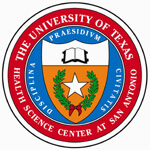 Research productivity in the School of Medicine at The University of Texas Health Science Center at San Antonio is highlighted in a new report from the Association of American Medical Colleges (AAMC).
Research productivity in the School of Medicine at The University of Texas Health Science Center at San Antonio is highlighted in a new report from the Association of American Medical Colleges (AAMC).
The Health Science Center’s department of urology ranked ninth among U.S. urology departments in research grant/contract funding per urology faculty member, the report showed. The UTHSC department of medicine was No. 10 among U.S. internal medicine departments, based on funding per faculty, and the department of psychiatry was No. 14 among psychiatry departments. The report, generated from 2005 data, was made available April 23 by the AAMC.
The AAMC ranked departments of the 126 U.S. medical schools by dividing grant and contract total funding by number of faculty. The urology, internal medicine and psychiatry rankings were the highest for any Texas institution in those categories.
A climate of excellence
“We are cultivating a climate of research excellence in the School of Medicine, one that is leading to national prominence,” said Francisco G. Cigarroa, M.D., president of the Health Science Center. “This ranking demonstrates the novelty and relevance of the projects undertaken by our faculty as we seek solutions for cancer, diabetes, heart disease and many other vexing problems.”
“We have tremendous faculty in our school, and their interests address many of the conditions that are of most relevance to our South Texas population,” said William L. Henrich, M.D., M.A.C.P., dean of the School of Medicine and vice president for medical affairs at UTHSC.
Funding per faculty is well over U.S. average
The 133 full-time internal medicine faculty of the Health Science Center worked on clinical research grants and contracts totaling $26.7 million in 2005. This total exceeded the national average of $23.1 million for all internal medicine faculties and the $17.9 million average for public institutions’ internal medicine faculties. The Health Science Center average of $200,899 per faculty member more than doubled the national average of $83,104 for public institutions.
The psychiatry faculty’s $175,144 average was substantially higher than the U.S. public institution average of $73,686. Likewise, the urology department average of $132,072 more than doubled the U.S. public institution average of $61,135.
HSC makes top third on overall rankings
The AAMC report also included overall institutional rankings, which were determined by dividing research grant/contract expenditures of all clinical departments by the number of faculty members in the departments. In that list, the Health Science Center ranked 35th among the 126 U.S. institutions with $49.8 million expended by 607 full-time faculty members, for an average of $82,126 per faculty member. That surpassed the national average of $64,825.
This is one of a series of high rankings for the Health Science Center. A recently announced survey in the publication Science Watch ranked the Health Science Center sixth in the nation in clinical medicine research impact for the period 2001 to 2005.
Also this spring, U.S. News & World Report made public its 2007 graduate education rankings, which commended the UTHSC School of Nursing for offering one of the nation’s best master’s degree programs in nursing, and the UTHSC School of Allied Health Sciences for offering one of the nation’s best physician assistant studies programs. Both of those programs made repeat appearances on the lists.
The University of Texas Health Science Center at San Antonio is the leading research institution in South Texas and one of the major health sciences universities in the world. With an operating budget of $536 million, the Health Science Center is the chief catalyst for the $14.3 billion biosciences and health care industry, the leading sector in San Antonio’s economy. The Health Science Center has had an estimated $35 billion impact on the region since inception and has expanded to six campuses in San Antonio, Laredo, Harlingen and Edinburg. More than 22,000 graduates (physicians, dentists, nurses, scientists and allied health professionals) serve in their fields, including many in Texas. Health Science Center faculty are international leaders in cancer, cardiovascular disease, diabetes, aging, stroke prevention, kidney disease, orthopaedics, research imaging, transplant surgery, psychiatry and clinical neurosciences, pain management, genetics, nursing, allied health, dentistry and many other fields.

